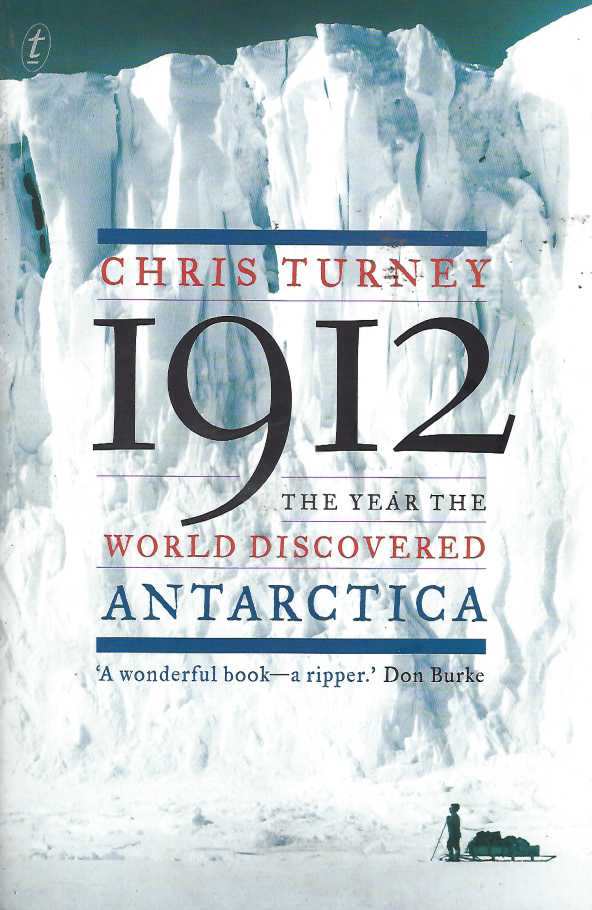- 1912: The Year the World Discovered Antarctica is a beautifully illustrated and entertaining history that chronicles the adventures of the Australasian, British, Norwegian, Japanese and German expeditions as they pushed through the final frontier of exploration – the desolate, frozen continent of Antarctica.
- Young and energetic Australian/British geologist and self-proclaimed adventurer Chris Turney takes readers on an enthralling journey back to the year the world discovered the south pole, recounting incredible tales of endurance, self-sacrifice and technological advancement.
- In a world exclusive, Chris Turney breaks some of the silence surrounding Scott’s death and reveals a new aspect of what happened to his team during their tragic return from the pole.
- A must-read for fans of Tim Flannery, David Attenborough, Michael Palin and Simon Winchester.
- To view photos and footage of Chris Turney’s adventures in Antarctica as he researched this book, visit his website www.christurney.com
- pp. 358 illusts First Edition thus
- Explorers — Antarctica — History. | History – Polar Regions. | General & world history. | History / Expeditions & Discoveries. | Science – Earth Sciences – General. | Science – History. | Antarctica — Discovery and exploration. | Discoveries in geography. | Explorers — Biography. | Antarctica — Discovery and exploration. | Australian
-
Chris Turney’s 1912 is an entertaining and beautifully illustrated history of an awe-inspiring subject. The rivalry between Robert Scott and Roald Amundsen is a familiar story; what fewer people know is that, in 1912, five separate teams were exploring beyond the limits of the known world: Scott for Britain, Amundsen for Norway, Mawson for Australasia, Filchner for Germany and Shirase for Japan. The Antarctic discoveries made by these brave explorers enthralled the world and forever changed the way we understand our planet. Chris Turney tells the story of the frozen continent, the heroic trials endured by its explorers and the lasting legacy for future scientific endeavour. Devoting a chapter to each of the five expeditions, he draws on previously unpublished archival material, framing the narrative with the broader idea of the spirit and excitement of scientific discovery. Professor Chris Turney is an Australian and British Earth scientist, and an ARC Laureate Fellow in climate change at the University of New South Wales. He is the author of Bones, Rocks and Stars: The Science of When Things Happened and Ice, Mud and Blood: Lessons From Climates Past, as well as numerous scientific papers and magazine articles. In 2007 he was awarded the Sir Nicholas Shackleton Medal for outstanding young Quaternary scientists, and in 2009 he received the Geological Society of London’s Bigsby Medal for services to geology. ‘The new David Livingstone.’ Saturday Times ‘Hundreds of books have been written about this era of Antarctic exploration, but in telling the gripping, lesser known tales, 1912 is an excellent addition.’ New Scientist ‘Drawing on his own considerable polar experience, historic photographs and journals, [Chris Turney] presents a fascinating story of the men behind the first exploration of Antarctica. A well written and historically important work.’ Waikato Times ‘What makes this book of particular interest to those familiar with Antarctic exploration literature is the somewhat unusual (and welcome) fact that it was written by a climate scientist. As a historian of the motivation, events and characters of Antarctic exploration, Professor Turney does a workmanlike job. But as a historian of the science behind the aforementioned he is brilliant.’ Good Reading ‘Turney successfully conveys the heroism and flaws of the early explorers as they challenged the preternatural dangers of Antarctica.’ Pubishers Weekly US ‘A breathtaking journey into the expeditions, their traumas and dramas, their leaders and achievements…Chris Turney tells a fascinating tale.’
1912: The Year the World Discovered Antarctica
$18.00
Sold Out
Additional Information
| Author | Turney, Chris, 1973-, |
|---|---|
| Number of pages | pp. 358 illusts |
| Publisher | Text Publishing, Melbourne |
| Year Published | 2012 |
| Binding Type | Softcover |
|---|---|
| Book Condition | Fine |
